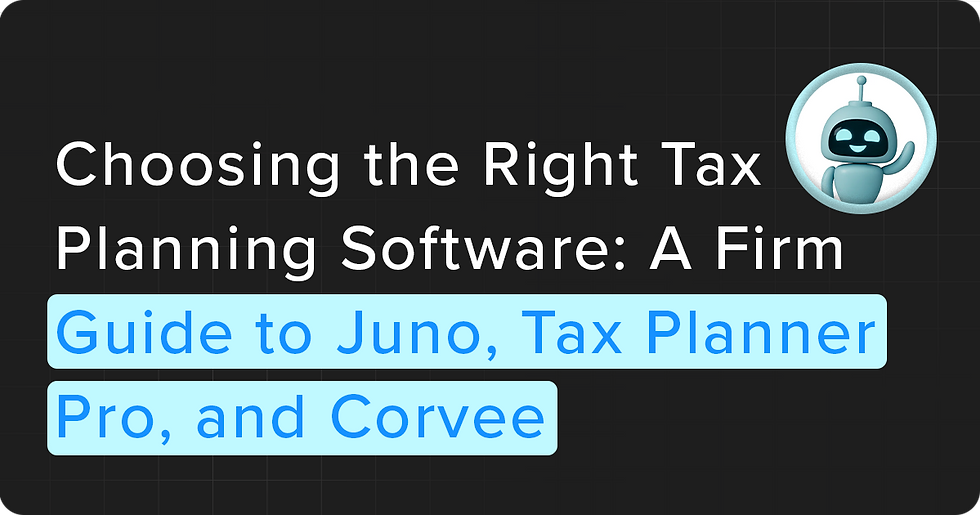Choosing the Right Tax Planning Software: A Firm Guide to Juno, Tax Planner Pro, and Corvee
- Alik Mock
- Oct 31, 2025
- 3 min read

Tax planning software is becoming a must-have for accounting firms that want to move beyond compliance and into high-value advisory. Clients expect proactive strategies, accurate projections, and insights that reduce their tax liabilities throughout the year. Juno, Tax Planner Pro, and Corvee each promise to help firms deliver these outcomes, but they take very different approaches. This blog compares the three platforms to help firms identify which solution best aligns with their workflow, client mix, and long-term strategy.
What does Juno offer companies seeking to streamline their workflows?
Juno is built for tax planning at scale. It pulls client financials and prior returns into a planning workspace, maps them to the tax code and relevant case law, and automatically surfaces opportunities with cited authority. Advisors can run side-by-side scenarios, quantify savings, and produce branded plans that include implementation steps and owner assignments. Playbooks encompass individual and business strategies, including entity and compensation design, retirement plan optimization, accountable plans, and state-specific considerations. Integrations with your ledger keep projections current, while alerts track changes in life and revenue, allowing you to revisit plans proactively. The result is a repeatable planning process that credibly answers client questions, turns insights into action, and grows advisory services without adding headcount.
How does Tax Planner Pro support tax advisory services?
Tax Planner Pro is designed to help firms move beyond compliance into proactive tax planning and strategy. It combines individual and business tax planning in one platform and is priced economically, typically around $1,500 per year, making it highly competitive. You get ready-made planning strategies, side-by-side scenario comparisons, and branded, client-ready reports that spotlight potential savings. It integrates with QuickBooks and Xero to pull live financials for better projections, and implementation is straightforward, allowing firms to launch or scale advisory services quickly without overhauling their workflows.
Why do firms choose Corvee for advanced tax planning?
Firms choose Corvee when they already run sophisticated tax advisory and need deep, multi-entity, multi-state planning supported by an extensive strategy library and tax code references. It models entity structure, compensation planning, and long-range scenarios, and with its expansion into professional tax preparation, it is moving toward a unified advisory and compliance platform. The tradeoff is between cost and complexity, with pricing typically starting around $20,000 per year. Many firms will use only a fraction of the features without dedicating sufficient time and resources to process changes. For experienced planning shops serving high-net-worth clients and larger businesses, Corvee can provide differentiation and scale. For firms earlier in their advisory journey or with simpler needs, Excel, Tax Planner Pro, or Juno often deliver faster ROI.
What are the key differences firms should weigh?
The differences come down to planning approach and complexity. Juno centers on automated discovery and plan assembly, pulling client data to surface opportunities, generate personalized strategies, run quick what-ifs, and track implementation so teams can deliver repeatable planning at scale. Tax Planner Pro emphasizes approachability, offering ready-made strategies for individuals and businesses, side-by-side scenario comparisons, and polished client reports at an economical price for fast advisory wins. Corvee prioritizes depth, offering multi-entity and multi-state modeling, long-range entity and compensation design, and a comprehensive strategy library for high-net-worth and complex business clients, accompanied by higher costs and a steeper learning curve. Select based on your client mix, advisory cadence, and the level of modeling and governance required.
Which platform is the best fit for your firm’s strategy?
The right choice depends on your priorities. If you need efficient and scalable planning, Juno is a strong option; it automates preparation and ties case law and tax code directly to each client’s data, allowing you to surface opportunities and answer client questions in real-time. Suppose your focus is on providing straightforward advice that enhances relationships. In that case, Tax Planner Pro is an ideal starting point, offering ready-made strategies, side-by-side scenarios, and polished client reports. If your firm plans to lead with sophisticated planning for complex clients, Corvee is the most substantial long-term investment, offering deep multi-entity modeling and long-range strategy.
Final takeaway for accounting firms
Firms need to maintain substantial compliance while shifting conversations and revenue toward advisory services. Tax planning is the bridge from reactive filing to proactive, solution-driven guidance. Juno focuses on automation and accuracy, enabling teams to deliver planning at scale. Tax Planner Pro keeps planning accessible with quick setup, ready-made strategies, QBO/Xero integration, and client-friendly reports. Corvee provides depth for complex, multi-entity scenarios and long-range strategy. Define whether your priority is efficiency, accessibility, or depth, then choose the platform that aligns with your client mix and advisory model.
Contact Genwise today to get expert advice tailored to your business and confidently move forward with the right platform.


